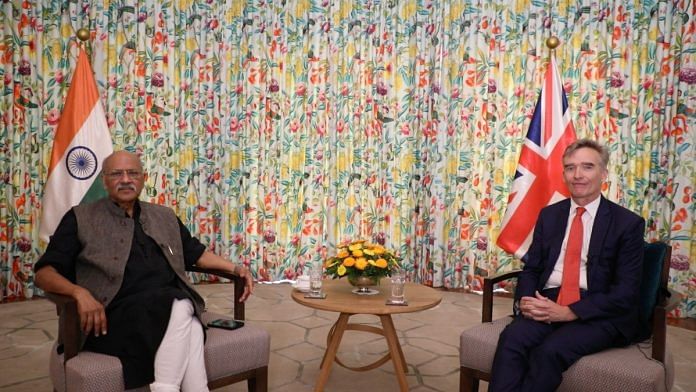New Delhi: The United Kingdom wants Canada to take its probe into the killing of Sikh separatist Hardeep Singh Nijjar to its conclusion, British High Commissioner Alex Ellis has said, admitting that “certain cases have affected both countries”.
The diplomat, however, further said that there must be a “shared desire” to tackle extremism globally but “within legal and judicial frameworks”. This should not affect partnerships, Ellis told ThePrint’s Editor-in-Chief Shekhar Gupta during a session of Off The Cuff.
The UK is part of the Five Eyes intelligence-sharing alliance along with Canada, the US, Australia and New Zealand.
India-Canada ties nosedived last year when Prime Minister Justin Trudeau linked New Delhi with Nijjar’s murder outside a gurdwara in British Columbia on 18 June. Trudeau said his security apparatus had reason to believe that “agents of the Indian government” had carried out the killing of Nijjar, a Canadian citizen. India dismissed the charge as absurd and motivated, and the spat dealt a fresh blow to diplomatic ties that have been wearing thin for years, with New Delhi unhappy over Sikh separatist activity in Canada.
Ellis also spoke about the issue of illegal migration to the UK. He emphasised the importance of finding the “right balance” and enhancing cooperation between India and the UK, and added that the notable rise in legal visas to Indians was encouraging and indicated an influx of visitors and students, “which is positive”.
However, the issue of overstayers and those who entered the country illegally must be addressed, considering their vulnerability and the risks associated with their journey to the UK, the high commissioner said.
Discussing the changing geopolitical landscape, the high commissioner said that it calls for democracies like India, Canada and the UK to collaborate, especially in the face of challenges posed by autocracies like China.
“China is a very powerful and dynamic autocracy with a very different view of the world. And all countries are adjusting to that, whether that’s Canada, India, or the UK. There’s an ever-greater need for democracies of the world who want to be open and free in the Pacific to be working together,” Ellis said.
Ellis also spoke about the mutual collaboration between India and the UK in addressing the COVID-19 pandemic, and praised the cooperation between Oxford University, AstraZeneca, and the Serum Institute of India.
He also expressed optimism about progress in negotiations for a free trade agreement (FTA) between India and the UK, noting the strong support from the two main political parties in the UK.
The diplomat said the FTA was a means to an end. “In free trade agreement discussions, both parties in the UK (Labour and the Conservatives) are strongly supportive of having a closer economic relationship with India. They’re a way of increasing trade and investment between two countries. Both sides want to have an ambitious deal and are working very hard at it, with a determination that it actually bring real, tangible benefits to the economies on both sides,” he said, adding that ultimately, it was a decision that the two countries’ prime ministers will have to take.
Ellis acknowledged the significance of India in terms of opportunities for the UK, post Brexit — particularly in areas such as trade, investment, defence cooperation and maritime security.
He highlighted the positive momentum in bilateral relations, citing External Affairs Minister S. Jaishankar’s call for a reset of relations post-Brexit.
Reflecting on the broader global context, Ellis spoke of a growing alignment between India and the UK driven by shared interests and values, and both countries’ diversity.
Ellis also touched upon the need for greater cooperation in areas such as science, technology, and sustainability, highlighting the potential for both countries to work together to achieve mutual goals. “The UK is looking to create a framework like iCET,” he added, referring to the US-India initiative on Critical and Emerging Technology.
Towards the end of the discussion, addressing concerns about immigration and diversity, Ellis underscored the strength of the UK’s multicultural society and the importance of managing immigration effectively while harnessing the talents of diverse communities.
“I think one of the successes of the UK in the last generation is the integration of people from all parts of life, all parts of the world into the United Kingdom. And I think that’s one of our strengths as a country. We’re an unusually global country,” he said.
(Edited by Tikli Basu)

Also read: Very bad quality data in India, Consumer Survey 2017-18 was worst, says economist Surjit Bhalla



